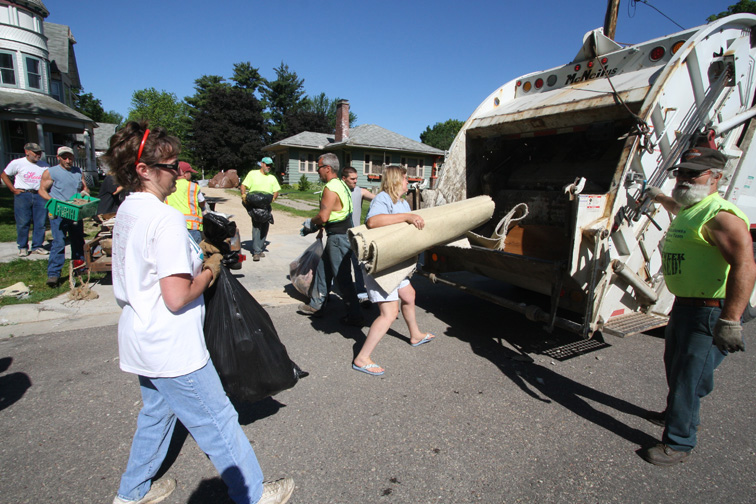
WINFIELD, Mo. (BP)–Driving south from Reedsburg, Wis., toward Iowa City, Iowa, and into Winfield, Mo., on the outskirts of St. Louis, there is a sense that you are following a very large, unbreaking wave.
In Reedsburg, the streets and yards were dry, but the water certainly had been there. Silt and sand from the Baraboo River blanketed chain-link fences and the tops of backyard swing sets. Buildings were lined three feet high with yellow waterlines. Sandbag walls still skirted businesses while the smell of raw sewage lingered on many streets.
Though the worst of the floodwater had receded, much of the impact of the disaster was only beginning to devastate the people who live there.
From Southern Baptist disaster relief volunteers, Red Cross workers and Trinity Baptist Church pastor Mike Lopp, one heard that key streets located closer to the Baraboo — Walnut, East James and Granite — were the hardest hit.
One 70-something Reedsburg resident named Sandy stood in her front yard on Walnut and described how sewage seeped into her home because Reedsburg’s water treatment facility had reached capacity. This was the case with most affected houses there.
“If I hadn’t had a sump pump,” she said, “it would’ve come out through the windows and doors.”
On Granite Avenue, a street now dotted with condemned houses, a woman and her husband had just finished remodeling their basement the very day the water started to rise.
The thought that someone like a disaster relief volunteer would show up at her front door had never occurred to her or other residents of the area.
Now, pairs of disaster relief volunteers from the Minnesota-Wisconsin Baptist Convention braved the stench of the woman’s home with white masks, rubber boots and large plastic buckets to remove debris that reached the upper-floor windows.
On down Granite Avenue, a man whose house had been condemned talked about the three vintage guitars he saved but not much else.
“The city kicked me out of my home,” he said, his eyes tearing up. His grandchildren gathered around him, then ran toward an approaching Red Cross truck full of food prepared by Southern Baptist disaster relief volunteers. On East James, Illinois disaster Relief workers joined a local high school football team to clear out a flood-damaged home.
“This is called a ‘blue boy,'” said Illinois mud-out team leader Bob Jackson, pointing to a long metal rod with a blade at one end. Another volunteer used it for scraping out wet molded carpet. This house, too, would have to be gutted.
Six people in Reedsburg accepted Christ as volunteer teams and chaplains helped meet physical and emotional needs. The community came together as neighbor helped neighbor.
An hour south in Green Spring, whole neighborhoods were surrounded with water.
Things were only worse in Iowa City, Iowa, where University of Iowa students sunbathed on high ground above campus streets flooded by the Iowa River. Businesses were closed. Utilities were turned off. Residents sloshed around in rubber boots with boats full of their belongings in tow.
“In our son’s neighborhood in Cedar Rapids, people’s belongings are piled head-high,” said a retired Methodist minister who came with his wife to survey the damage.
When he saw the Alabama Baptist disaster relief unit gutting a home across the street, he quoted Matthew 25:40: “… I assure you: Whatever you did for one of the least of these brothers of Mine, you did for Me.”
Sandbag walls helped some, but not enough to hold back an overwhelmed Iowa River. And this makes sketchy the situation in Missouri, where the floodwaters will crest today (June 26) in St. Louis suburbs such as Clarksville and Winfield.
Three or four major levees in Missouri are buckling due to pressure from the mighty Mississippi, a situation so tenuous that even muskrats burrowing into the levees or a passing motorboat can cause a threat. In these areas, homeowners already were evacuating. Some had to be evacuated by boats provided by neighboring county fire departments.
The farmland of Winfield looked like one big beautiful lake, with homes half-submerged in the rising torrent. Egrets waded in the quick-made shallows.
“At lunchtime, our driveway was dry and now you can barely see it,” one homeowner said as he looked on with his three sons from behind a sandbag wall. Fishing poles leaned against the barrier. A green paddle boat tethered to a front porch post rocked gently in the rising waters.
Only a few miles away, the Mississippi continued to fill neighboring farmland and communities. National Guardsmen watched over flooded neighborhoods to prevent possible looting while residents waded, unprotected, through water that officials warned could be dangerously contaminated with bacteria, sediment and fertilizers.
The water peaked in the area earlier this week. Officials in Lincoln County asked for volunteers to fill 50,000 more sandbags to fortify the Pin Oak levee, where the river has softened the ground and where a breach would flood more than 100 homes.
As with most areas downriver, as one resident put it, “the waiting is the worst.”
There is overall the great sense that, no matter what, the Midwest will rebuild.
“We’re fine,” one woman in Iowa City said. “We’re alive.”
In all, Southern Baptists have served 3,807 volunteer days, prepared more than 180,000 meals, cleared out 117 homes from mud and other flood debris, provided 1,218 showers and made more than 1,800 chaplaincy contacts in the Midwest flood region.
–30–
Adam Miller is associate editor of On Mission magazine with the North American Mission Board.

















